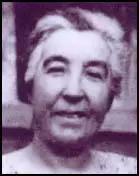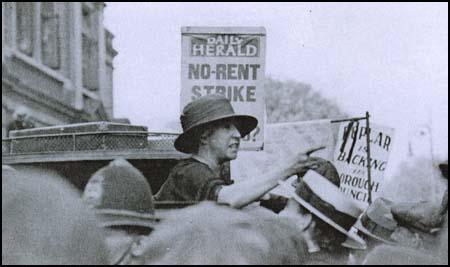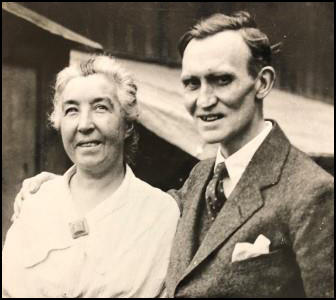Julia Scurr

Julia O'Sullivan was born in Limehouse on 17th February 1873. Her father was John O'Sullivan, an immigrant from Cork.
Julia married John Scurr in Woolwich in 1899. The couple had two sons and a daughter. At the time her husband was an active member of the Social Democratic Federation, and was associated with people such as H. M. Hyndman, Tom Mann, John Burns, Eleanor Marx, George Lansbury, Edward Aveling, H. H. Champion, Helen Taylor, Guy Aldred, John Spargo and Ben Tillet.
In 1905 Julia joined forces with James Keir Hardie, Dora Montefiore, George Lansbury to organise a deputation on unemployment of 1,000 women to meet the Prime Minister, Arthur Balfour. During this period she also became active in the struggle for women's suffrage and worked very closely with Sylvia Pankhurst.
In 1907 Julia Scurr became a member of to the Board of Guardians that ran the Poplar Workhouse. Working closely with George Lansbury she presented a report criticizing the lack of Day Rooms and recreational space at the Bow Infirmary.
In 1913, Sylvia Pankhurst, with the help of Julia Scurr, Millie Lansbury, Keir Hardie and George Lansbury, established the East London Federation of Suffragettes (ELF). An organisation that combined socialism with a demand for women's suffrage it worked closely with the Independent Labour Party. As June Hannam has pointed out: "The ELF was successful in gaining support from working women and also from dock workers. The ELF organized suffrage demonstrations and its members carried out acts of militancy. Between February 1913 and August 1914 Sylvia was arrested eight times.... She also drew on East End traditions by calling for rent strikes to support the demand for the vote."
On 6th February 1914 a group of supporters of women's suffrage, who were disillusioned by the lack of success of the National Union of Women's Suffrage Societies and disapproval of the arson campaign of the Women Social & Political Union, decided to form the United Suffragists movement. Membership was open to both men and women, militants and non-militants. Members included Julia Scurr, Emmeline Pethick-Lawrence, Frederick Pethick-Lawrence, Evelyn Sharp, Henry Nevinson, Margaret Nevinson, Hertha Ayrton, Israel Zangwill, Edith Zangwill, Lena Ashwell, Louisa Garrett Anderson, Eveline Haverfield, Maud Arncliffe Sennett, John Scurr and Laurence Housman.
Julia Scurr led a deputation of East End women to see Prime Minister Henry Asquith in June 1914 to protest about the low wages being paid to women. She told him: "Any rise in the price of rents, foods and other household commodities affects us women vitally... The position of working-class women is one that we all feel deeply. Our husbands die on the average at a much earlier age than do the men of other classes. Modern industrialism kills them off rapidly both by accident and by overwork... we are left often with a family of young children to support... The Poor Law has treated us mercilessly. It is hated by every poor woman. In many cases outdoor relief is altogether denied to the widow, as it is to the deserted wife, and only the Workhouse is offered, which means separation from the children."
In November 1919 Julia Scurr was elected to Poplar Council. The Labour Party had won 39 of the 42 council seats. In 1921 Poplar had a rateable value of £4m and 86,500 unemployed to support. Whereas other more prosperous councils could call on a rateable value of £15 to support only 4,800 jobless. George Lansbury proposed that the Council stop collecting the rates for outside, cross-London bodies. This was agreed and on 31st March 1921, Poplar Council set a rate of 4s 4d instead of 6s 10d. On 29th the Councillors were summoned to Court. They were told that they had to pay the rates or go to prison. At one meeting Millie Lansbury said: "I wish the Government joy in its efforts to get this money from the people of Poplar. Poplar will pay its share of London's rates when Westminster, Kensington, and the City do the same."

On 28th August over 4,000 people held a demonstration at Tower Hill. The banner at the front of the march declared that "Popular Borough Councillors are still determined to go to prison to secure equalisation of rates for the poor Boroughs." The Councillors were arrested on 1st September. Five women Councillors, including Julia, Millie Lansbury and Susan Lawrence, were sent to Holloway Prison. Twenty-five men, including George Lansbury and John Scurr, went to Brixton Prison. On 21st September, public pressure led the government to release Nellie Cressall, who was six months pregnant. Julia Scurr reported that the "food was unfit for any human being... fish was given on Friday, they told us, that it was uneatable, in fact, it was in an advanced state of decomposition".
Instead of acting as a deterrent to other minded councils, several Metropolitan Borough Councils announced their attention to follow Poplar's example. The government led by Stanley Baldwin and the London County Council was forced to back down and on 12th October, the Councillors were set free. The Councillors issued a statement that said: "We leave prison as free men and women, pledged only to attend a conference with all parties concerned in the dispute with us about rates... We feel our imprisonment has been well worth while, and none of us would have done otherwise than we did. We have forced public attention on the question of London rates, and have materially assisted in forcing the Government to call Parliament to deal with unemployment."

In the 1923 General Election, John Scurr, Susan Lawrence and George Lansbury were all elected to the House of Commons.The Labour Party won 191 seats. Although the Conservative Party had 258 seats, Herbert Asquith announced that the Liberal Party would not keep the Tories in office. If a Labour Government were ever to be tried in Britain, he declared, "it could hardly be tried under safer conditions".
On 22nd January, 1924 Stanley Baldwin resigned. At midday, Ramsay MacDonald went to Buckingham Palace to be appointed prime minister. MacDonald had not been fully supportive of the Poplar Councillors since he thought that "public doles, Popularism, strikes for increased wages, limitation of output, not only are not Socialism but may mislead the spirit and policy of the Socialist movement." George Lansbury was therefore not offered a post in his Cabinet.
John Wheatley, the new Minister of Health, had been a supporter of the Poplar Councillors. Edgar Lansbury wrote in The New Leader that he was sure that Wheatley would "understand and sympathise with them in this horrible problem of poverty, misery and distress which faces them." Lansbury's assessment was correct and as Janine Booth, the author of Guilty and Proud of It! Poplar's Rebel Councillors and Guardians 1919-25 (2009), has pointed out: "Wheatley agreed to rescind the Poplar order. It was a massive victory for Poplar, whose guardians had lived with the threat of legal action for two years and were finally vindicated."
Julia Scurr died on 10th April 1927 at the age of 57. George Lansbury wrote that he had no doubt that the period of imprisonment, and the treatment she received, was directly responsible for her death.

